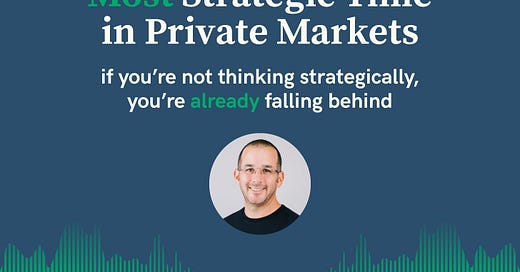Why This Is the Most Strategic Time in Private Markets
if you’re not thinking strategically, you’re already falling behind
Private markets are changing fast. The story of growth is no longer just about raising a fund or outperforming a benchmark. It’s about knowing who you are—and making moves that align with where the capital is going.
"the private markets investment management industry, is more strategic than it's ever been. I think leaders need to recognize that and I think they need to dedicate resources and time to being strategic and executing on that strategy to be successful." - Ted Gooden, Växa Partners
In my conversation on The Distribution podcast, Ted Gooden, founding partner of Växa, we discuss the evolution of private markets.
Here is my take on where we are:
Private markets have evolved from niche, product-driven boutiques into a global, strategic industry defined by platforms, scale, and specialization.
Initially, firms were led by smart individuals spinning out of investment banks or larger institutions to launch focused strategies—private equity, credit, or real estate. Capital flowed based on relationships and performance.
Then came the rise of the mega-managers. IPOs and public currency allowed firms like Blackstone, KKR, and Apollo to go on acquisition sprees, building multi-asset platforms. Insurance companies followed, bringing long-term capital and strategic intent to the space. The result was a land grab—consolidation that reshaped the market.
Today, we’re in the next phase. The biggest platforms dominate institutional flows. But there’s still white space:
Cross-border expansion
Asset-class adjacencies
Distribution into private wealth
Mergers of like-sized firms to reach scale
Strategic capital is everywhere—but only flows to those with clarity of purpose, institutional stability, and differentiated value.
Being good isn’t enough.
You need to be strategically positioned and operationally ready to grow.
“And to some degree, as investors are becoming more comfortable with the underlying investments that they're taking, they feel like there's some interest at least to be going with platforms that offer more solutions unless the platform or unless the investment management company can really offer alpha or exposure in a very targeted way that they can't get elsewhere.
The biggest platforms are hovering up capital because they can offer solutions—not just products.
So where does that leave the rest?
“The mid and smaller organizations… great performance, great client service, smart, nice people, doing everything right, kind of [have] an increasingly hard time to attract that capital or that money in motion.”
That dynamic creates one of the most active—and strategic—environments for M&A and partnerships the industry has ever seen.
It’s not just about the biggest buying the best. It’s also about like-minded firms coming together to grow relevance, reach, and resources.
“In the last year or so, we’ve probably seen or participated in more conversations of independent firms talking about merging… than we have in the history of the investment management industry.” says Gooden
Growth isn’t just about getting bigger—it’s about becoming more investible. Gooden describes this as..
“There's never going to be anything wrong with having a great product and great performance… But if you're looking from a macro perspective, the concept of being a solution… it’s just gonna be like gravity.”
Investment managers have a lot of options when it comes to growth:
→ Strategic minority deals
→ Insurance company partnerships
→ Selling a stake
→ Full acquisitions
→ Distribution alliances
→ Mergers (including cross border transactions)
The key is knowing when, how, and with whom. The details matter. A lot. Many think that in order to grow they need to sell their business.
This is not true.
In a market defined by consolidation, the best operators know their position, control their narrative, and proactively shape their path.
Based on dozens, if not hundreds of conversations I have with GP’s looking to explore strategic capital, there are a few things that the best are doing:
They are in the market before they need to be. Building relationships. Working “on” their business, not just “in” their business. Get out there, network, build relationships. The best know they just may need them one day
Know your “why”. This is both how you talk about your business to investors but also “why” are you doing this. What are your goals? What is fullinfilling for you? What are your priorities. Just because you can raise money or have a strategic transaction doesn’t mean you should. I am always amazed how many leaders are truly miserable despite looking like they have “made it” for those on the outside looking in.
The group that will give you the best terms may not be your best partner. Fit matters more than price. Even if you can get better terms elsewhere, in most instances this is a partnership, fit matters more than price. You are making a commitment and breaking that is hard, expensive and stresfull.
This is the most strategic time in the history of our business. It’s not about selling. It’s about growing—with intention.
To dive deep into Ted’s views on private markets and that of 75+ other leaders, you can listen to The Distribution podcast on apple podcast, spotify and youtube.
Check out past episodes of The Distribution for other insights on strategic capital
Episode 34 with Peter Braffman from GCM Grosvenor
Episode 37 with Deb Smith from Center Cap group
Episode 40 with Matt Kaplan from Almanac
Episode 50 with Wes Whitman from Whitman Peterson
Episode 54 with Todd Rich from Declaration
Episode 60 with Charlie Ruffel from Kudu Investments
Episode 63 with Christopher Zook from CAZ Investments
LinkedIn Live w/ Jen Stevens from Alliance Global Advisors




